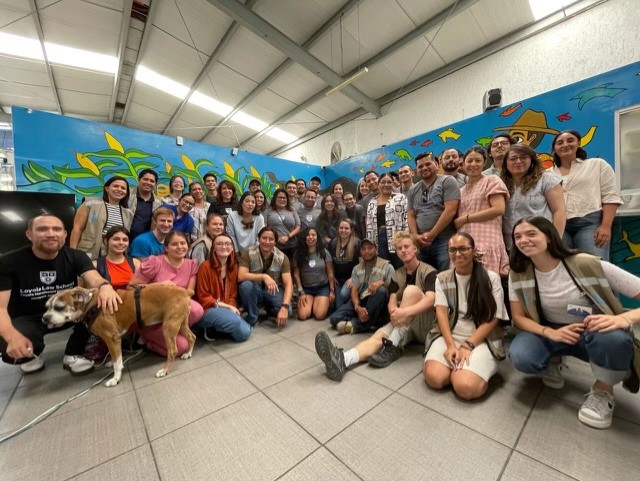
Loyola Immigrant Justice Clinic’s innovative program brings law students to Guadalajara, Mexico, to offer legal support and bilingual educational resources for migrant populations on both sides of the border.
“At LMU Loyola Law School, we believe effective U.S. and Mexican immigrant rights lawyers must learn to work collaboratively beyond borders,” says Marissa Montes ’12, director and co-founder of LIJC. “Loyola Law School's partnership with sister Jesuit university ITESO, Universidad Jesuita de Guadalajara, offers our students international opportunities to gain greater understanding and awareness of legal, political and human rights issues of migrant populations in both countries.”
In Guadalajara, LIJC worked with Guadalajara's largest migrant shelter, FM4, to provide consultations to migrants in transit and advocate for unaccompanied children's rights before Mexican government agencies. Students visited shelters, provided bilingual 'Know Your Rights' training, and conducted intakes.
LIJC students also represented nine DACA recipients seeking Advance Parole, accompanied them to Guadalajara, and successfully re-entered the United States. All nine DACA recipients, who are members of the greater Loyola Law School community, may now more easily access a pathway to legal permanent residency.
Loyola Law School's collaborative work in Mexico is cross-cultural and cross-linguistic and vital to establishing the support and legal resources migrant populations on both sides of the border need. Guadalajara, Mexico serves as the halfway point for migrants traveling by train to the northern border, specifically those seeking to arrive at the Tijuana- San Ysidro point of entry. The city is also home to other sub-populations impacted by U.S. immigration laws, including mixed-status families. Loyola Law School is also located in Los Angeles, which is home to the largest Mexican diaspora outside of Mexico.
“As the U.S. government continues to externalize its borders, we as advocates must also adapt to properly defend the rights of the migrant community and prepare law students for the future of immigrant rights advocacy. We are honored to work in partnership with our binational partners and sister Jesuit institutions and look forward to continuing our collaboration," says Loyola Immigrant Justice Director and Co-Founder Marissa Montes.
LIJC actively works on binational cases, most recently assisting a 14-year-old unaccompanied minor from Venezuela, who sought reunification with her family in the United States. Throughout its 11-year history, over 100 students have participated in the Loyola Immigrant Justice Clinic and have successfully represented hundreds of clients under the supervision of LIJC staff.
The Loyola Immigrant Justice Clinic is at the forefront of immigrant advocacy, paving the way for innovative, community-informed, collaborative legal services, and transforming the way we train and teach the next generation of immigrant rights lawyers.